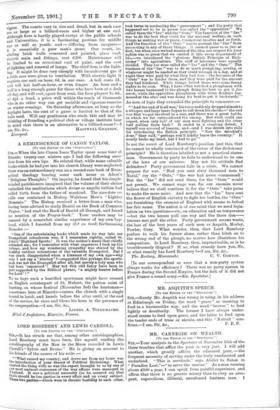LORD ROSEBERY AND LEWIS CARROLL.
[TO THE EDITOR OF THE " SPEETATOR.1
Sin,—It has struck me that, among other autobiographies, Lord Rosebery must have been, like myself, reading the autobiography of the Man in the Moon recorded in Lewis Carroll's; " Sylvie and Bruno." He is giving an account to Ins friends of the causes of his exile :—
" What ruined my country, and drove me from my home was the introduction of your theory of Political Dichotoiny. What started the thing with us was the report brought to us by one of oar most eminent statesmen of the way affairs were managed in kngland. It was a political necessity (so he assured us) that there should be two parties in every affair and on every subject. These two parties—which were in chronic hostility to each other, took turns in conducting the " government "; and the party that happened not to be in power was called the "opposition." We called them the "Ins" and the "Outs." The function of the " Ins " was to do the best they could for the national welfare, in such things as making war or peace, commercial treaties and so forth. And the function of the " Outs " was to prevent the "Ins" from succeeding in any of these things. It seemed queer to us just at first, but when once we had mastered the idea our respect for your nation was so great that we carried it into every department of life,—we introduced the "glorious British Principle of Dich- otomy" into agriculture. The staff of labourers were equally divided. They too were called the " Ins" and the "Outs." The business of the "Ins" was to do as much plough ing, sowing, or whatever might be needed as they could manage in a day, and at night they were paid by what they had done ; the business of the "Outs" was to hinder them, and they were paid for the amount they had hindered. While things lasted there were some funny sights to be seen. Why, I have often watched a ploughman with two horses harnessed to the plough doing his best to get it for- wards, while the opposition ploughman with three donkeys har- nessed at the other end was doing his best to get it backwards."
As men of logic they extended the principle to commerce :-- "And the end of it all was,' his voice suddenly dropped almost to a whisper, and large tears began to roll down his cheeks—' the end was that we got involved in a war, and there was a great battle, in which we far outnumbered the enemy. But what could one expect, when only half of our men were fighting and the other half pulling them back ? It ended in a crushing defeat, I myself was accused of treason, and—and I was driven into exile for introducing the British principle. "Now the mischief's done," they said, "perhaps you'll kindly leave the country.' It nearly broke my heart, but I had to go."
Is not the secret of Lord Rosebery's position just this, that he cannot be wholly convinced of the virtue of the dichotomy principle? He is therefore labelled as not a practical states- man. Government by party he fails to understand to be one of the laws of our universe. May not his attitude find defenders ? Party government fails in a crisis. We cannot prepare for war. "Had you sent sixty thousand men to Natal," cry the "Outs," "the war bad never commenced." But the " Ins " did not send them, for the " Outs " would not permit. We cannot wage war, for our enemies never believe that we shall continue it, for the " Outs " take pains to make the more noise. And now that the "Ins" have sent the flower of English chivalry to fight her battles, the "Outs" are furnishing the enemies of England with means to befoul her fair name. The nation is of one mind that we need legis- lation on two questions—viz., on education and on temperance —but the two horses pull one way and the three don— (excuse me) pull the other. Party government means waste, the loss of the best years of such men as Asquith, Morley, Fowler, Grey. What wonder, then, that Lord Rosebery prefers to walk his furrow alone, rather than hitch on to the wrong end of the plough, no matter how illustrious his companions. Is Lord Rosebery, then, impracticable, or is he troublesomely illogical ? If so, what remedy have you, Sir, or what remedy has Lord Rosebery P—I am, Sir, &c., [Is our correspondent so sure that a non-party system always works for efficiency ? There was no party system in France during the Second Empire, but the lack of it did not give France a sound army.—En. Spectator.]










































 Previous page
Previous page